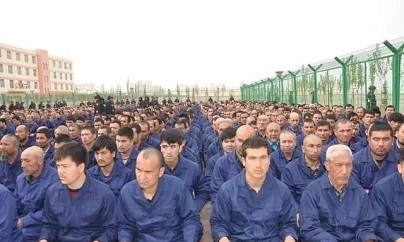China Continues to Crackdown on Muslims in Detention Camps
Over one million Muslims are living in Chinese detention camps which are being questioned for their treatment of Muslim ethnic groups.

Muslim detainees in a Chinese re-education camp in 2017.
Dec 19, 2019
Beginning in 2014, China has operated detention camps formally known as Xinjoang re-education camps for the purpose of indoctrinating for foreign citizens who are detained for terrorism and extremism, specifically Uyghur Muslims.
The number and populous of detention camps has increased over the years due to the amount of Muslims being arrested to the camps. It was officially announced that in 2018, millions of Muslims are being kept under these camps without a trial.
In 2019, the number of Muslims being kept under the surveillance of Xinjiang Uyghur Autonomous Regional Government has increased even more. It has changed drastically from 1 million to approximately 3 million prisoners.
As the numbers expand, countries around the world display their disapproval of China’s operation of the camps including Australia, Canada, France, Germany, Japan, the United Kingdom and the United States. They all have signed documents in hopes to dissuade China from continuing the ‘harsh’ treatment of Muslims in detention camps and allowing for fair trials.
Many individuals have expressed their concerns about the treatment of individuals living in the internment camps following the leaking of more than 400 pages of internal Chinese documents that described how authorities created, managed, and justified the continuing crackdown on one million or more ethnic Uyghurs and Kazakhs.
Asiye Abdulaheb, a Uyghur woman living in the Netherlands, said that she helped publicize 24 pages of secret Chinese government documents that exposed how Beijing runs mass detention camps holding Muslim ethnic minorities, adding to the questioning of the morality of these camps.
Initially, Chinese officials brushed away questions about the camps, but late last year, Beijing responded defending the camps as job-training centers that teach the Mandarin language and practical skills, and educating people of the dangers of religious extremism and terrorism.
Chinese government spokesmen and media outlets have attacked the reports, calling them “fake news” and claiming that they were part of a conspiracy to undermine stability in the country.
In the past years, tensions have existed between largely Muslim ethnic minorities and China’s Han ethnic majority in Xinjiang, occasionally erupting in violence. The Muslim ethnic groups’ languages and cultures set them apart from Han people.
Despite China’s denouncement of accusations, foreign countries remain unwilling to believe China’s responses.







